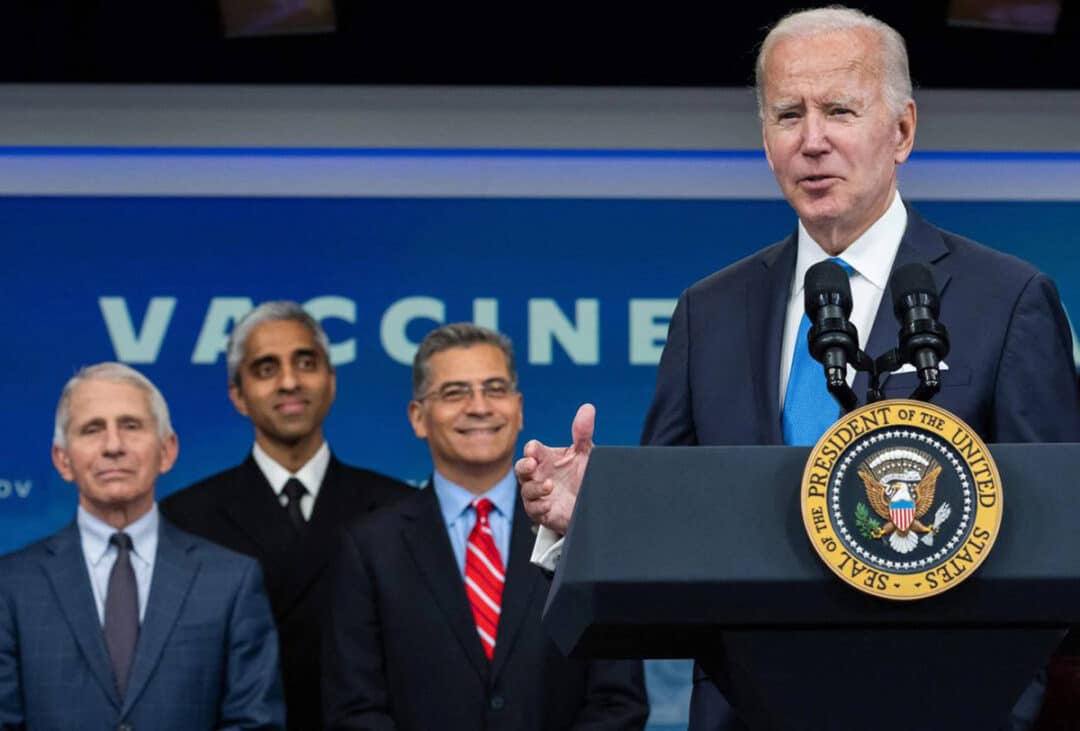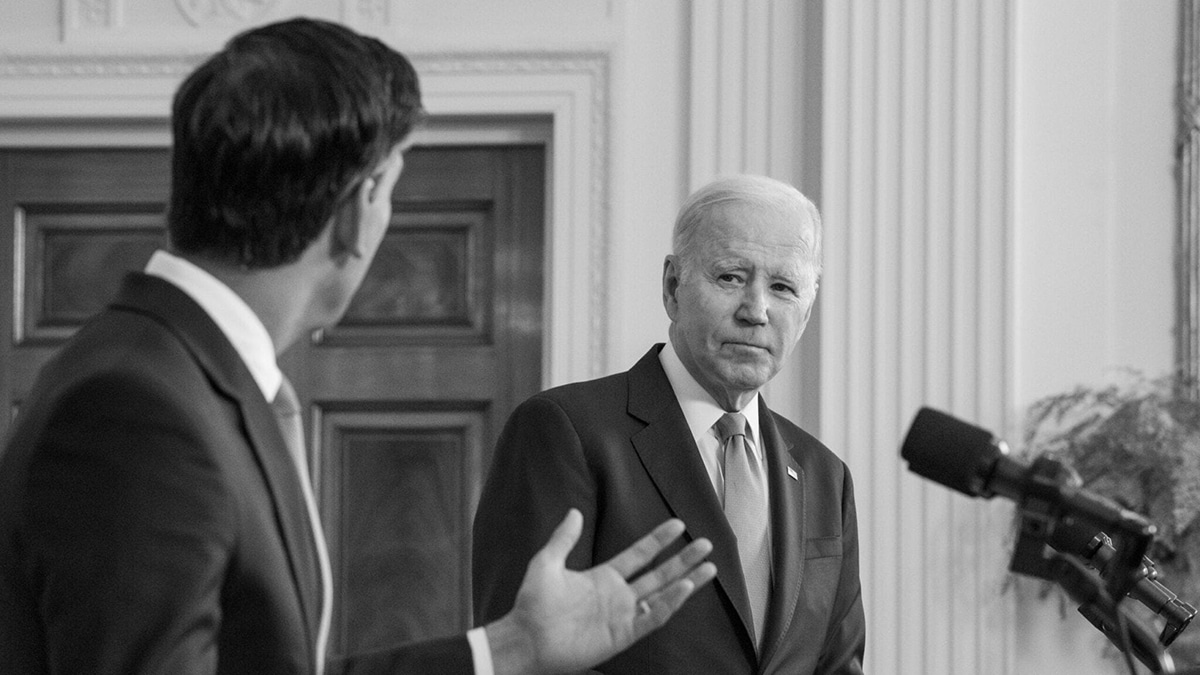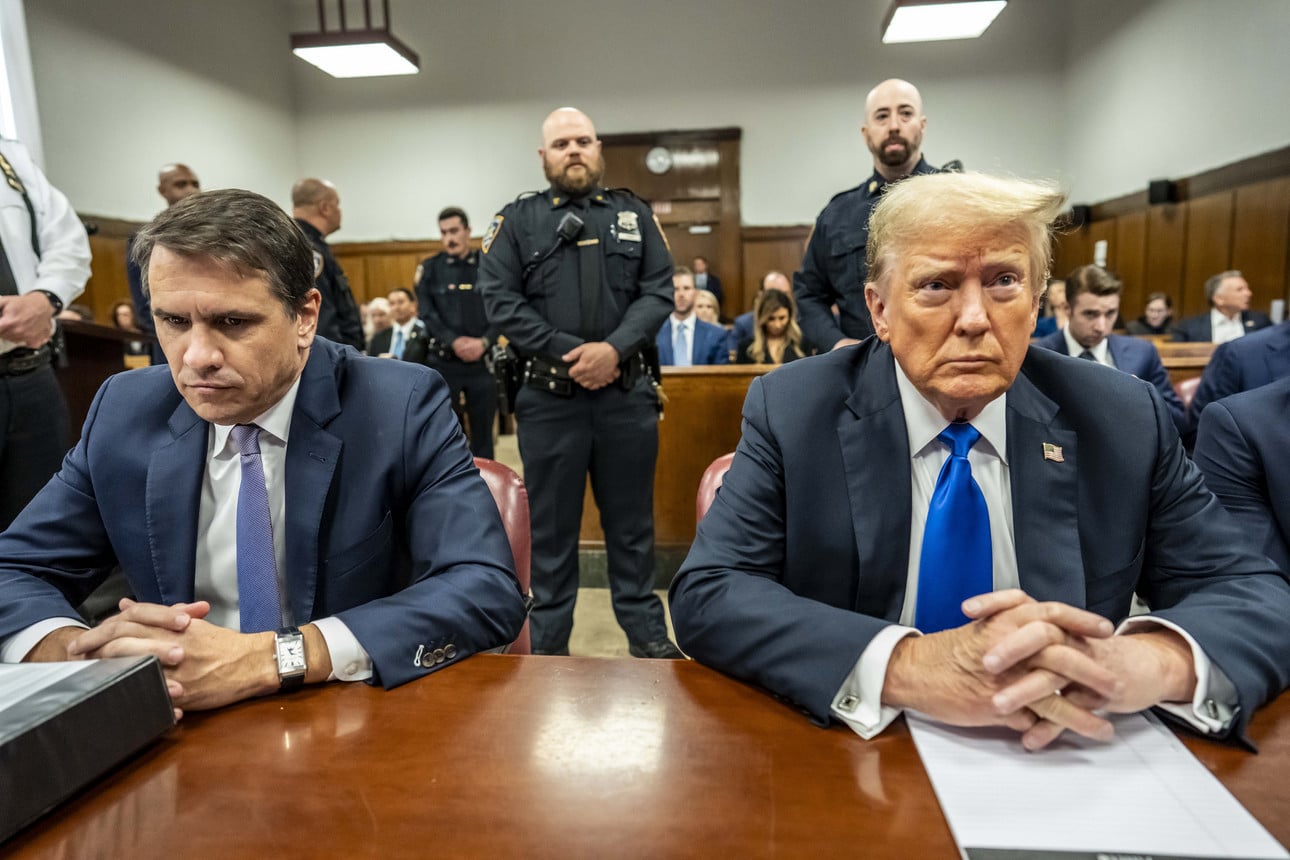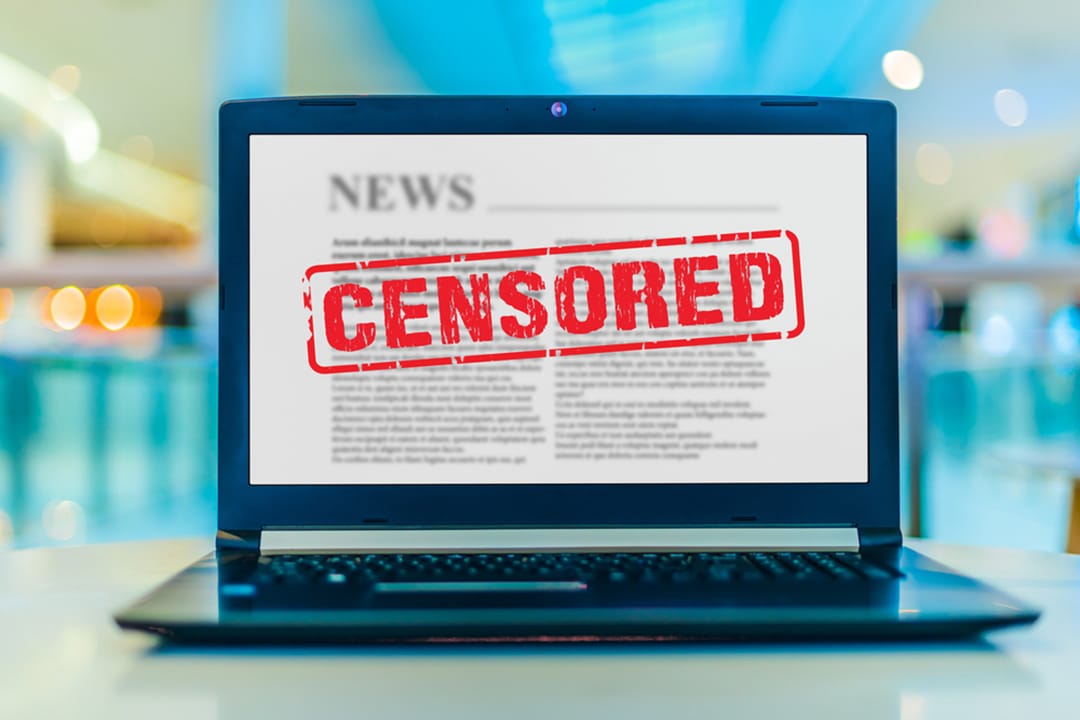

From left: Anthony Fauci, Vivek Murthy, and HHS Secretary Xavier Becerra look on as Joe Biden delivers remarks ahead of receiving a COVID-19 booster on Oct. 25, 2022SAUL LOEB/AFP VIA GETTY IMAGES
America’s Censorship Regime Goes on Trial
Ernest Ramirez, a car-wash technician in a small, south Texas town, led a simple but fulfilling life with his son, Ernesto Junior. Junior was a “wonderful child, full of smiles.” Ramirez had raised his son alone; he’d never known his own father and sought to provide Junior with the paternal love he had missed. A talented baseball player, Junior dreamed of playing professionally. The two lived paycheck to paycheck but were happy because, as Ramirez put it, they had each other.
Then, on April 19, 2021, 16-year-old Junior—who had no previous health problems—received the first dose of the Pfizer COVID-19 vaccine. Five days later, the young athlete collapsed while running. By the time the elder Ramirez arrived at the hospital, having been told he could not ride in the ambulance with his son, Junior was dead.
According to the autopsy report, the cause of Junior’s death was an “enlarged heart.” Upon receiving the news, Ramirez lost all desire to go on living. But after the initial shock subsided, Ramirez decided to travel and speak about Junior’s fate, in hopes that he could help other families avoid similar tragedies.
That plan proved more difficult than Ramirez anticipated. In September 2021, GoFundMe removed an account he had opened to raise money for a trip to the nation’s capital to share his son’s story. “The content of your fundraiser falls under our ‘Prohibited Conduct’ section,” the company’s email explained. Ramirez lost the donations he had thus far received. Two months later, Twitter took down a photograph Ramirez had posted depicting him standing beside Junior’s open casket, along with the caption “My good byes to my Baby Boy” followed by three brokenheart emojis. Even a father’s simple expression of grief was apparently forbidden by the social media platform’s government-supported censorship regime.
Around that time, Ramirez met Brianne Dressen, a 40-year-old woman who had volunteered for the AstraZeneca vaccine trials and suffered a severe adverse reaction diagnosed by the National Institutes of Health (NIH) as “post-vaccine neuropathy.” Her varied and acute symptoms at times required use of a wheelchair and drastically curtailed her ability to participate in her young children’s lives.
For a time after her diagnosis, Dressen fell into a severe depression. However, during the spring of 2021, she discovered online support groups for vaccine-injured individuals and their family members. Connecting to others who understood her plight greatly improved her outlook on life, and she began serving as an administrator of several of the groups.
But in July 2021, less than 24 hours after Dressen participated in a press conference with U.S. Sen. Ron Johnson of Wisconsin, Facebook shut down one support group’s account. Though participants had merely discussed their often-harrowing personal experiences and shared medical treatments that they found helpful, Facebook claimed they were spreading harmful “misinformation” that warranted the group’s removal.
The cascade of shutdowns of support groups and accounts belonging to the vaccine injured on Facebook and other social media platforms continues to this day. Ramirez, Dressen, and others learned that when their accounts weren’t suspended or removed, they were shadow-banned—meaning that the platforms’ algorithms buried their posts so that they were rarely, if ever, viewable, even to like-minded individuals facing similar health problems. In Dressen’s words: “The constant threat of having our groups shut down and our connections pulled apart left me and many other members and leaders frozen, unable to communicate and connect with those who needed our help the most. We spent more time managing the chaos of the censorship algorithms that continued to evolve, than we did actually helping people through the trauma of their injuries.”
Astute social media users noticed that censorship on platforms such as Twitter and Facebook escalated in tandem with the government’s threats, often yielding absurd results. For example, Twitter marked as misleading Dr. Martin Kulldorff’s April 2021 tweet stating that not everyone needed a COVID-19 vaccine, especially children and the previously infected. Dr. Kulldorff is one of the world’s most cited epidemiologists and infectious disease experts. That he was censored for speaking on the area of his expertise by someone almost certainly far less knowledgeable should concern any fair-minded person purely on the basis of preserving the openness that is required for educated scientific debate. (Last month, the World Health Organization revised its official recommendation, saying that children and teenagers may not need COVID-19 vaccines—a position deemed “misinformation” not half a year ago.)
The administration’s public threats, combined with the corresponding campaign of social media censorship, prompted several prolific social media users to file lawsuits against the Biden administration and a number of federal agencies alleging that their First Amendment free speech rights had been violated.
One of the First Amendment’s fundamental promises to all American citizens is freedom from government-induced, viewpoint-based censorship. “If there is any fixed star in our constitutional constellation, it is that no official, high or petty, can prescribe what shall be orthodox in politics, nationalism, religion, or other matters of opinion,” the Supreme Court explained in 1943. A doctrine known as state action theory explicitly prohibits the government from using private entities as intermediaries to do what it cannot do directly. In the court’s words, it is “axiomatic that a state may not induce, encourage or promote private persons to accomplish what [the state] is constitutionally forbidden to accomplish.”
The plaintiffs in the social media cases argued that, since the First Amendment prohibits the government from censoring Americans for expressing certain views, government actors likewise cannot coerce, direct, or collude with private social media platforms to suppress airing of perspectives disfavored by the United States government.
For the most part, the initial wave of lawsuits against the Biden administration have been unsuccessful: The judges held that the plaintiffs had not supplied sufficient facts from which to infer that the censorship on social media platforms was the product of government intervention, as opposed to the companies’ own internal content moderation policies.
But in one case, Missouri v. Biden, the judge wisely allowed the lawsuit to proceed, implicitly recognizing that without a discovery order to permit a look behind the scenes at the companies’ own internal deliberations and direct communications with the government, virtually no individual plaintiff would ever be able to establish that he or she had been censored at the government’s behest. The lawsuit was brought last May by the attorneys general of Missouri and Louisiana, who were joined by private plaintiffs including epidemiologists and co-authors of the Great Barrington Declaration (GBD) Dr. Jayanta Bhattacharya and Dr. Kulldorff. (Full disclosure: In my capacity as litigation counsel at the New Civil Liberties Alliance, I represent Drs. Bhattacharya, Kulldorff, and two other private plaintiffs in the case.)
Written in October of 2020, the authors of the Great Barrington Declaration warned against the economic and social repercussions that lockdowns and other COVID restrictions would entail. Instead, they recommended steps in line with what had previously been the consensus approach to pandemic management, which would protect the vulnerable while allowing the rest of society to resume normal life. As revealed in private emails exposed pursuant to a FOIA request, Bhattacharya and Kulldorff were censored extensively on social media after Dr. Anthony Fauci of the National Institute of Allergy and Infectious Diseases and Dr. Francis Collins of the NIH targeted the GBD for a “quick and devastating takedown.” During the same exchange, Collins described Stanford’s Bhattacharya and Harvard’s Kulldorff as “fringe epidemiologists.”
The Missouri judge ordered both the government defendants and tech companies to produce written exchanges between them containing various search terms, and required several high-ranking government officials—including Dr. Fauci—to sit for depositions. The resulting emails, text messages, and testimony have revealed that scads of government actors, across at least a dozen federal agencies as well as within the White House itself, exerted direct and continuing pressure on social media platforms to censor posts expressing viewpoints on a wide variety of matters—from COVID-19 to the 2020 election to the Hunter Biden laptop story—that threatened the agenda of government actors. (Though Biden did not assume office until January of 2021, a number of agencies, including CDC, NIH, DHS, and FBI, acted independently to achieve these censorship aims, which then escalated shortly after the inauguration.) Put otherwise, the fruits of discovery established that the government was doing what it said it was doing.
For example, in March of 2021, Rob Flaherty, White House director of digital media, sent an email to a Facebook executive bearing the accusatory subject line, “You are hiding the ball.” The body of the email contained only a link to a Washington Post article claiming that Facebook was aware that its platform was being used to “spread ideas that lead to vaccine hesitancy.” When the Facebook executive responded that there had been a “misunderstanding,” Flaherty replied that he did not think so: “We are gravely concerned that your service is one of the top drivers of vaccine hesitancy—period. … We want to know that you’re trying, we want to know how we can help, and we want to know that you’re not playing a shell game … this would all be a lot easier if you would just be straight with us.”
About a week later, the Facebook executive followed up with Flaherty in an obvious effort to appease the White House official, notifying him that Facebook had made the requisite policy changes which included “removing vaccine misinformation” and “reducing the virality of content discouraging vaccines that does not contain actionable misinformation.” That included removal of “Groups, Pages and Accounts” containing, in the executive’s words, “often-true content” that “can be framed as sensation, alarmist, or shocking.” The tragedies Dressen and Ramirez had endured and sought to share on social media undoubtedly fell into the category of “shocking” and “true.” Indeed, their inconvenient truths were just the sort of material Flaherty sought to prevent from reaching the American public.
This was only one of dozens of emails employing a similarly aggressive, berating tone, that Flaherty sent Facebook, Google, and other companies. And Flaherty was only one of nearly 100 federal officials exploiting his office to ensure that Americans who expressed opinions or reported experiences that conflicted with the message the government wished to propagate were not heard by the public—and were not able to connect with each other.
Just last month, in what is likely to become a decision of historical significance, the Missouri judge denied the government’s motion to dismiss. In doing so, Judge Doughty recognized that federal government officials’ relentless pressure campaign to suppress the speech of Americans on social media that inconvenience the administration’s political agenda cannot be reconciled with the First Amendment. In the judge’s words, the “significant encouragement and coercion” exhibited by federal officials such as Flaherty “convert[ed] the otherwise private conduct of censorship on social media platforms into state action.”
The lawsuit is still in its early stages. But Judge Doughty’s decision marks a crucial first step toward ensuring that going forward, government actors like Flaherty cannot use their clout to effectuate the removal of social media content or shut down online support groups. Explicit judicial attention to such practices is necessary because it seems clear that, having enjoyed a taste of the censor’s power, political operatives and government bureaucrats see no reason to give it up. In fact, rather than retreating from its thus-far successful censorship activities, the government has been expanding its ambitions to encompass every corner of the public square. Disfavored viewpoints on an ever-increasing number of subjects on a growing array of platforms are being targeted for removal and shadow-bans, at the behest of more and more government agencies.
If the First Amendment stands for anything, it must mean that the government cannot be in the business of silencing Ernest Ramirez and Brianne Dressen, or of preventing them from associating with each other online simply because their inconvenient truths threaten a political agenda. It is up to the courts to put an end to this egregious transgression of the First Amendment’s guarantees, because if we have learned anything from history, it is that governments do not relinquish power voluntarily.
The obstacles encountered by Ramirez, Dressen, and thousands of other individuals with similar experiences and opinions were in no way coincidental or accidental. Nor were they the result of a series of errors in judgment made by low-level employees of social media platforms. Rather, they were the products of concerted efforts at the highest levels of the American government to ensure that individuals with opposing viewpoints could not be heard, contrary to the guarantees made to every American citizen in the Bill of Rights. One purpose of these unconstitutional actions to violate the rights of American citizens was political gain.
As COVID-19 inoculations became widely available to the American public, the Biden White House came to view vaccine hesitancy as a significant political problem. Beginning in spring 2021, the administration explicitly and publicly blamed social media platforms for vaccine refusal: By failing to censor “misinformation” about the vaccines, the president infamously alleged, tech companies were effectively “killing people.” The president’s incendiary accusation was accompanied by threats of regulatory or other legal action (should the companies refuse to comply) from various high-ranking members of the administration, including former White House Press Secretary Jennifer Psaki, Surgeon General Vivek Murthy, and Department of Homeland Security (DHS) Secretary Alejandro Mayorkas. Psaki boasted that government officials were in regular touch with social media platforms, telling them what and in some cases even whom to censor.





0 Comments